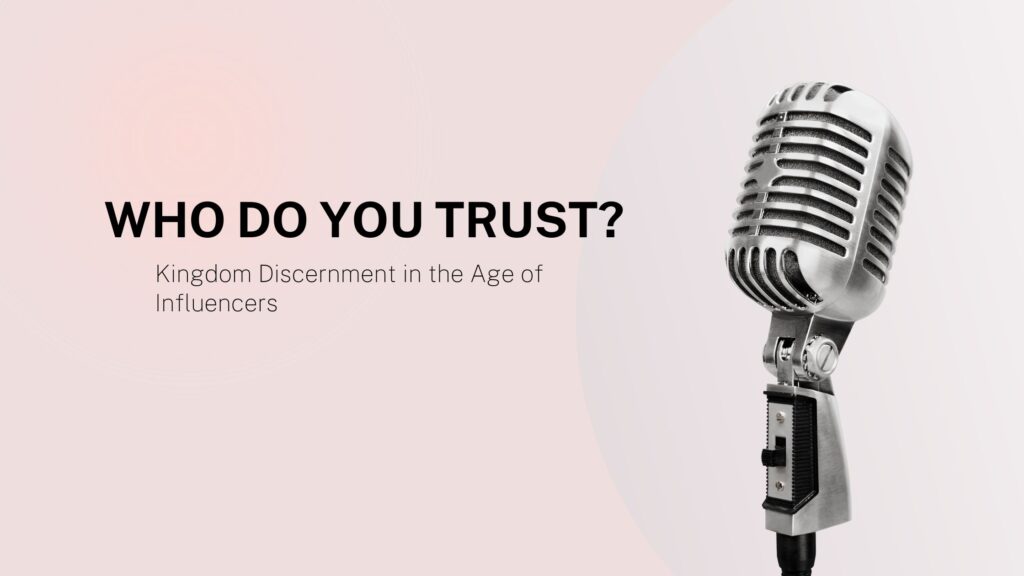
Who Do You Trust? Kingdom Discernment in the Age of Influencers
The internet has created a world where a single post can shift public opinion overnight. From health and wellness to business strategy, we’re constantly surrounded by voices telling us what to think, what to buy, and who to believe.
Recently, a very public debate erupted in the wellness space. The MAHA (“Make America Healthy Again”) movement has been sweeping through social media, with influencers promoting an anti-GMO, “clean” lifestyle as the ultimate health goal. Then, Michelle Miller — better known as “The Farm Babe” — stepped in to challenge their claims, defending GMOs and modern agricultural science.
Within hours, the internet chose sides. Some cheered Miller for pushing back against fear-based marketing. Others dismissed her as a corporate shill.
And just like that, the debate over food became a deeper question:
Who do we trust in a world where every voice has a platform?
The Influence Economy
Not long ago, we relied on established institutions — newspapers, universities, and public broadcasters — to guide public discourse. Today, an individual with a smartphone can command as much influence as a newsroom.
There’s nothing inherently wrong with that. In fact, it’s one of the most exciting parts of the digital age — it allows anyone to share their voice. But there’s a hidden danger: when personality becomes the primary credential, charisma can replace credibility.
Influencers — whether in wellness, business, politics, or faith — can command massive loyalty without ever being vetted for truthfulness. Trust is no longer earned through long-term credibility; it’s often awarded to the most engaging storyteller.
When “Truth” Changes Every Month
The mixed messages about what’s right and healthy seem to change from one month to the next.
What workout is “best” for women going through menopause? Which diet is truly the most effective? And don’t even get me started on the so-called food pyramid.
If you’re confused about what’s right to eat or feed your family… you’re in good company. It seems there are as many “rights” and “wrongs” as there are influencers.
The best advice I can give? Test the voice. Use discernment. And at the end of the day… do your own personal research.
It takes work to test a “spirit” — to weigh the intention, the credibility of the messenger, and the method being promoted. In our fast-paced society, with AI-driven content and overwhelming workloads, there is no quick and easy shortcut to vetting truth.
And that’s just about food, health, and lifestyle. Add in the debates within the faith community — whether over female leadership, interpretations of the end times, or theological “musts” — and the list goes on.
Who is right, who is wrong, and who do we trust? When influencers can even make you doubt the very words of the Bible you’ve always held sacred… how can you be sure you’re receiving sound counsel?
The good news is — there’s an old prophet in a small book near the end of the Bible who gives timeless advice. While warning that there will always be people trying to lead others astray for selfish gain, he says:
“…constantly and progressively build yourself up on the foundation of your most holy faith by praying, fastening your hearts to the love of God, and receiving mercy from Him.” (Jude 1:20–21)
In a world of many opinions, you must have your own — rooted in a strong foundation of values and beliefs you hold as core and unshakable. And when you realize you’ve gotten it wrong, don’t be afraid to pivot, unfollow, and unsubscribe.
Remember: your “like,” your “follow,” and your “share” are powerful — they shape the landscape of influence.
So, the next time you wonder which business strategy is the “right one,” which faith community has the “right” stance, or which diet is truly best, maybe the journey should begin a little closer to home — inside your own convictions and foundational truths.
Now, before you think I’m suggesting a “your truth, my truth” philosophy — let’s pause. That’s not what I’m saying. Truth is neither suggestive nor wavering. Truth is solid, unchanging, and life-giving.
The challenge is not whether truth exists — the challenge is in doing the work to discover it. So vet, pray, meditate, and in the end, make the most sound decision you can… one that aligns with the foundation of your faith.
The Kingdom Lens on Influence
The Bible has a lot to say about discerning voices:
-
“Beware of false prophets, who come to you in sheep’s clothing but inwardly are ravenous wolves. You will recognize them by their fruits.” – Matthew 7:15–16
-
“The simple believes everything, but the prudent gives thought to his steps.” – Proverbs 14:15
-
“Beloved, do not believe every spirit, but test the spirits to see whether they are from God…” – 1 John 4:1
Influence is powerful, but not all influence is good. Kingdom discernment means weighing not just what is being said, but who is saying it, and why. It’s about looking for fruit, not just followers.
Practical Discernment in the Digital Age
-
Ask, “Who benefits?”
Every influencer has a motivation. It may be pure, it may be profit, or it may be both — but it’s worth asking the question. -
Look for patterns, not just posts.
A single good statement doesn’t make someone trustworthy. Consistency over time reveals a leader’s true heart and values. -
Check for alignment with Kingdom values.
Does the message lead to fear, division, and pride — or does it point toward truth, stewardship, and love? -
Filter through both wisdom and evidence.
Faith doesn’t mean blind trust. God gave us minds to think and resources to verify.
The Stewardship of Your Attention
We are responsible for who we allow to shape our thinking. Your attention is currency, and every follow, share, and click is a form of investment. In the same way a wise steward wouldn’t invest in a failing business, a Kingdom-minded believer shouldn’t invest in voices that produce bad fruit.
The call isn’t to distrust everyone — it’s to test what we hear, measure it against God’s truth, and be intentional about the voices we let influence us.
Question for you:
In the noisy age of influencers, who do you trust online, and what makes them credible to you? Drop your thoughts in the comments — let’s talk about what Kingdom discernment looks like in 2025.





A credible influencer would be one that you can check who’s “supporting” them. Follow the money trail always when it comes to your food and health and you’ll find out who’s in your best interest.
I agree with ‘do your own research’ We have become lazy and take in our 15 second clips of information from social media as truth.
It spans from nutrition, farming practices and yes listening to your favorite Christian influencer as well.
Research how much of social media is AI…it has surpassed humans! Remember that when you hear some one tell you what God says. Stick to the word, and your relationship with Him. Ask for discernment in what you see or hear .❤️
Well said! Tracing the money trail is pertinent. So, when it comes to food and health who do you follow?
Your article helped me a lot, is there any more related content? Thanks! https://accounts.binance.com/en-NG/register-person?ref=YY80CKRN